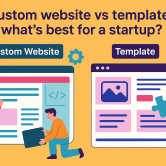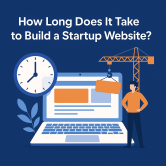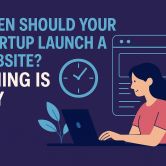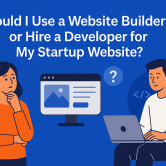Why Does My Startup Need a Website?
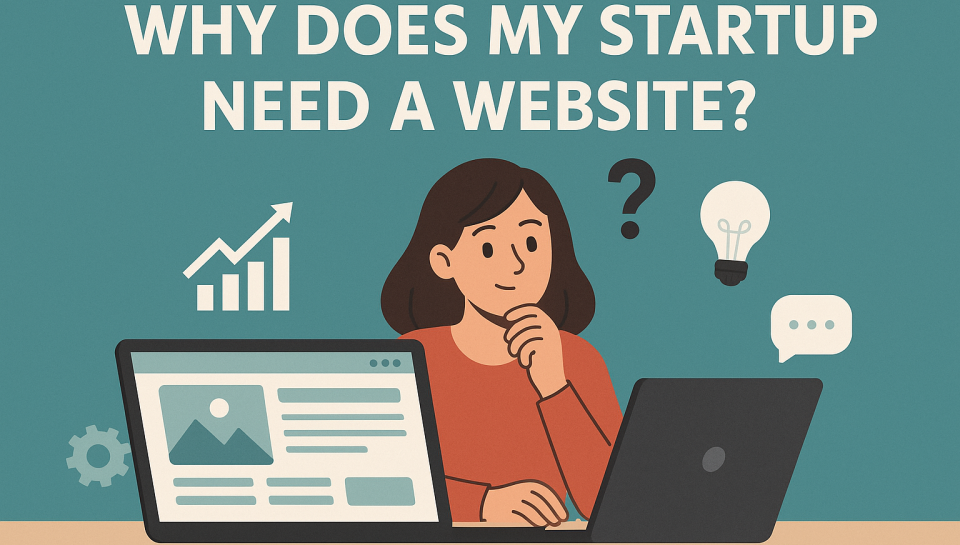
Introduction
Imagine you’re launching your dream startup — you’ve got the product, the passion, and even an Instagram page. But here’s the harsh truth: without a professional website for your startup, you’re practically invisible in the digital economy.
In today’s hyper-competitive business world, a website isn’t just a luxury—it’s a startup’s greatest marketing asset. Whether you’re looking to attract investors, convert leads, or build brand trust, a powerful website works like a 24/7 growth engine.
In this article, we’ll explore exactly why your startup needs a website, with real-world examples, strategic insights, and SEO-focused guidance to help you outperform your competition online.
1. Establishing a Strong Online Presence
A website is the digital identity of your startup. It gives you a central platform that represents your brand, services, and vision to the world. Unlike social media platforms or third-party marketplaces, a website is an owned asset—fully under your control. It helps you appear in Google search results, drives traffic from multiple sources, and acts as a 24/7 storefront where customers, investors, and partners can learn more about you. In a world where most buying decisions start with a Google search, not having a website means missing out on countless opportunities.
💡 Use Case:
A SaaS startup offering cloud HR services gained 10,000+ users within a year simply by launching a simple website with SEO-optimized landing pages. Their visibility skyrocketed after being indexed by Google and shared across LinkedIn.
Why it matters:
Your website shows up in Google Search, not your Instagram page.
Customers can learn about your services at any time—even at 2 a.m.
It becomes your digital headquarters, accessible worldwide.
2. Building Credibility and Trust
In an era of digital-first impressions, your website is often the first touchpoint your audience has with your brand. A well-designed website signals professionalism and commitment. It shows that you’re serious, established, and ready to serve. You can showcase your startup story, list your achievements, and display customer reviews—all of which contribute to building trust. Startups with strong websites are more likely to close deals, get funding, and win customer loyalty.
💡 Example:
Compare two startups—one with a basic landing page and another with a well-designed website featuring testimonials, FAQs, and company history. The latter will win the trust of investors and customers every time.
Highlights:
Verified contact info, founder bios, and story build transparency
Testimonials and case studies show proof of value
Good design = positive brand perception
Stat: 75% of people judge a business’s credibility based on its website design (Stanford Web Credibility Research).
3. Lead Generation and Conversion Optimization
Your startup website is not just a brochure—it’s a conversion engine. With the right strategy, it can turn visitors into leads, leads into customers, and customers into loyal advocates. Incorporating lead capture forms, call-to-action (CTA) buttons, chatbots, and downloadable resources can supercharge your customer acquisition. Every click can be tracked, analyzed, and optimized for better results. It’s the heart of any good sales funnel.
🎯 Conversion Tools:
Lead capture forms
Newsletter popups
CTA buttons (“Schedule a Demo” or “Try Free”)
Live chat widgets
💡 Use Case:
A digital marketing startup used a lead magnet—“Free SEO Audit Report”—on their homepage and generated 3,000+ leads in 60 days.
Bonus Tip: Connect your form submissions to CRM tools like HubSpot or Zoho for automated follow-ups.
4. Authority Building Through Content Marketing
If you want to be seen as an industry leader, you need a platform to share your knowledge—and that’s where a blog on your website comes in. Content marketing helps startups position themselves as trustworthy experts. Educational content like blog posts, how-to guides, videos, and case studies helps solve your audience’s problems, builds trust, and improves your visibility on Google. Plus, it fuels SEO, attracting visitors who are actively searching for your solutions.
💡 Example:
A fintech startup wrote weekly blogs like “How Startups Can Manage Cash Flow in 2025” and ranked for 20+ keywords. Organic traffic brought in VCs who later funded the company.
Advantages:
Establishes thought leadership
Supports SEO with long-tail keywords
Builds lasting customer relationships
SEO Insight: Focus on long-tail keywords like “website for startup company,” “best website design for tech startups,” or “startup website checklist.”
5. Enhanced Accessibility and User Experience
Startups must meet users where they are—and users are everywhere. From smartphones to desktops, your website needs to perform consistently across all devices. A fast, responsive, and accessible website not only improves user satisfaction but also boosts your SEO rankings. Accessibility also means designing with empathy—considering people with disabilities, slow internet, or non-native languages. Startups that deliver a smooth, inclusive user experience stand out and build better reputations.
Essential Features:
Responsive design
Fast page loads (<2 seconds)
Intuitive navigation
Accessibility for visually impaired users
💡 Real World Insight:
An e-commerce startup boosted conversions by 40% after optimizing its mobile site. Most of its users came from Instagram swipe-ups!
SEO Benefit: Google prioritizes mobile-friendly websites in search rankings.
6. Cost-Effective Marketing and Scalability
Every rupee or dollar counts in a startup. Thankfully, a website provides massive ROI over time. It’s your most cost-effective marketing tool, working silently while you sleep. You can run campaigns through landing pages, retarget visitors with email or ads, and track performance using free tools like Google Analytics. And as your startup grows, your website grows with you. Add features, new pages, products, and integrations without starting from scratch.
💡 Example:
A legal advisory startup scaled from 2 to 30 clients/month using only a blog and basic SEO tactics—zero ad spend.
Benefits:
Reduces long-term ad dependency
Supports multichannel campaigns
Grows with your business
Pro Tip: Use Google Analytics + Hotjar to optimize your marketing funnel from traffic to conversion.
7. Competitive Advantage in the Digital Marketplace
Your website is your digital advantage in an overcrowded market. With compelling visuals, sharp messaging, and targeted offerings, you can outperform even more established competitors. Most buyers compare multiple providers online—so having an optimized, conversion-ready site puts you in control of how you’re perceived. Stand out with tools like service calculators, ROI estimators, or interactive demos.
Key Strategies:
Clearly define your Unique Value Proposition (UVP)
Offer downloadable brochures or calculators
Use customer stories and metrics on your site
💡 Use Case:
A logistics startup displayed delivery time stats and client logos on its homepage, immediately building authority and closing B2B deals.
SEO Tip: Study your competitors’ keywords using tools like Ahrefs or Ubersuggest and out-rank them with better content.
8. Integration with Other Digital Tools and Platforms
A website isn’t isolated—it can integrate with your entire marketing ecosystem. From CRMs and email platforms to calendar booking and automation tools, your website acts as the central hub that powers your workflows. These integrations improve efficiency, personalize user experience, and automate repetitive tasks—saving you time and money. You can track sales, trigger emails, update your CRM, and sync lead data in real time.
Integrate with:
Email platforms (Mailchimp, ConvertKit)
Social media plugins
Calendars (Calendly bookings)
Analytics tools
CRMs
💡 Example:
A coaching startup embedded Calendly into their website and saw a 30% increase in booked sessions within the first month.
Automation Hack: Use tools like Zapier to connect form submissions to Slack, Google Sheets, or Trello.
9. Future-Proofing Your Startup
Startups thrive when they adapt quickly. Your website gives you that flexibility. Launching a new product? Update a landing page. Changing business models? Shift the messaging and call-to-actions. A flexible website built on platforms like WordPress, Webflow, or custom CMS allows you to test, tweak, and roll out changes fast—without touching code. This ensures that your online brand evolves with you, ready for whatever the market demands.
💡 Example:
A startup shifted from B2C to B2B in 3 months by updating their homepage, blog strategy, and landing pages—without any major platform changes.
Growth Mindset: Your website grows with you—be it new products, geographies, or business models.
Conclusion
If you’re a startup founder in 2025, a website is not optional—it’s essential.
It gives your startup: ✅ Credibility
✅ Global Visibility
✅ Automated Lead Generation
✅ Scalability
✅ Authority & Brand Trust
From showcasing your UVP to capturing leads in real-time, a website works while you sleep.
So, don’t delay. Invest in a powerful website for your startup and unlock the potential your business truly deserves.




